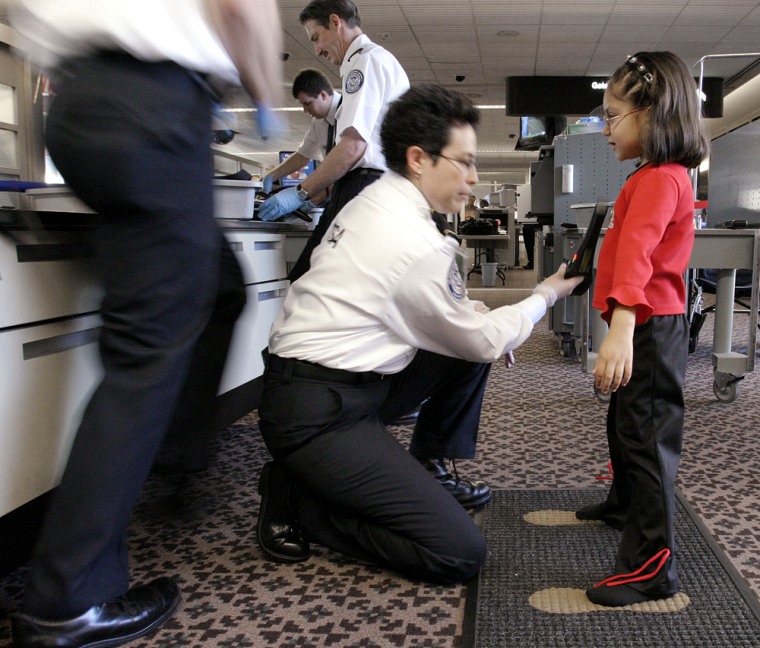If you’re planning on traveling this holiday season there are a few things you might consider just dropping off at the curb: your dignity, your dogma and your designer clothes.
And if your name is “David Nelson,” well, you might want to forgo the airport altogether and just drive, but we’ll get to that later.
Anyone who's flown since the terrorist attacks of 9/11 knows that air travel is inconvenient. Most people have accepted the trade-off of higher security at the cost of convenience. But what continues to frustrate travelers most are changing security procedures.
The latest security twist from the Transportation Security Administration is the “pat-down procedure.” This allows a TSA screener to essentially frisk a person’s body, including sensitive areas such as breasts, genitals and buttocks. The procedure is done in full view of other passengers — although you can request a private screening — and has generated a firestorm of criticism, especially from female passengers who have been subjected to the pat-down.
Free-country state of mind
Holiday airport travel probably isn’t the best time to decide to flex your dogma unless you’re also ready for the guaranteed extra security hassles that will follow.
Helen Chenoweth-Hage knows all about this. In October, the former congresswoman refused to be subjected to a pat-down at an airport in Boise, Idaho.
Chenoweth-Hage didn't initially object to a pat-down, but first she wanted to see the government rule mandating the new procedure. She balked when the local TSA security director refused her request. She was treated to a police escort back to the ticket counter, where she retrieved her bags and decided to rent a car and drive more than 400 miles to her destination.
John Gilmore has a similar story. On the July 4, 2002, Gilmore tried to fly from Oakland International airport in California. But when he was told to produce a picture ID, he asked to see the law underlying the request. The law, he was told, was a secret. He was not allowed to fly.
Gilmore hasn’t flown since and has sued U.S. Attorney General John Ashcroft for the right to see the law.
Beware the tickets you buy, the clothes you wear
Thinking about taking advantage of the numerous cheap, one-way airfares that are cropping up all over? You might want to consider the hidden security cost of such a purchase: Any one-way ticket automatically singles out the traveler for special, secondary screening. The same applies if you buy a ticket with cash instead of a credit card.
It’s also probably best to pack your designer clothes in your checked baggage instead of wearing them on the plane because those expensive coats, shoes and sweaters will likely have to come off at some point during the security screening. And harried TSA passenger screeners aren’t going to be all that concerned about how your high-priced threads get tossed around.
And don’t bother putting any kind of lock on your checked baggage because it won’t be there when you pick it up in baggage claim. TSA screeners are authorized to cut off any lock they find. The good news: The TSA will close your bag back up with one of those plastic tie-down locks, which of course, you’ll have to cut off when you arrive at your destination.
Flying with a note from the doctor
Be mindful that if you’ve had any kind of nuclear medicine procedure you’re likely to set off a highly sensitive, portable radioactive monitor used at security checkpoints. This is especially true if you’re traveling internationally.
“We started seeing these problems at the end of 2001, in the aftermath of 9/11,” said John Jacobus, a health physicist for the National Institutes of Health. “A lot of the problem is that patients very often don’t realize they are radioactive," Jacobus said. “For whatever reason it just doesn’t come up in the conversation (with the doctor), honest to God.”
Medical experts say if you’ve had such a procedure, you shouldn’t travel for about three days and if you must, be sure to get a note from your doctor that explains in detail what kind procedure you had. That note can save you untold hassle when presented to security personnel.
Woe if your name is David Nelson
And if all that weren’t enough, it turns out that even your name can turn airport travel into a nightmare. All airlines run potential travelers through what is known as the “no-fly” list. It’s a list of known or suspected terrorists or people who are a danger to the flying public. No one knows for sure what criteria land a person on the list because the TSA won’t explain.
But innocent people are caught in the web of TSA concerns and suspicions all the time. Anyone named David Nelson, for example, will be singled out and questioned extensively until he can prove his not the David Nelson on the agency's no-fly list.
One such David Nelson, a 34-year old lawyer from Belleville, Ill., has been cut from the traveling herd dozens of times. Nelson, along with several others, has sued the government over the workings of the no-fly list.
The TSA acknowledges the current system is flawed and says it has a new and improved version coming online. That system “will help eliminate most of the false alerts caused by the current outdated system,” the TSA says on its Web site.
